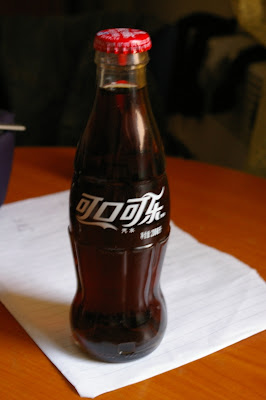
What's on tap for today? Well Coca-Cola only the most recognizable logo in the world. As an added bonus it is in a glass bottle which I bought for 1 RMB which is like $0.12 so it wasn't too expensive to get it on here. Whoever Coke pays to do their translation did an amazing job with this one. Not only does it look a lot like the original but it has meaning also.
So the brand reads 可(ke)口(kou)可(ke, again)乐(le) so phonetically it is kekou kele, very similiar right? What is crazy is that it has a good meaning in Chinese as well. As was shown yesterday with Maxwell house most brands have no literal meaning, but the translator earned their salt with this one. 可 (Ke) means "use" but it can also be used for emphasis. Kou (口) literally means mouth or opening, in this case it is mouth though. We see ke again and once again it is used for emphasis. And finally, 乐 (le), which means happy or satisfied. So taken all together 可口可乐 literally means an extra happy mouth. Strange in English but in Chinese it works beautifully, they love talking in metaphor and hyperbole so it definitely works and it sounds very similar.
So all in all Coke's Brand is pretty well translated into Chinese.
What's on tap for tomorrow? Skippy Peanut Butter (creamy none of that chunky crap).
